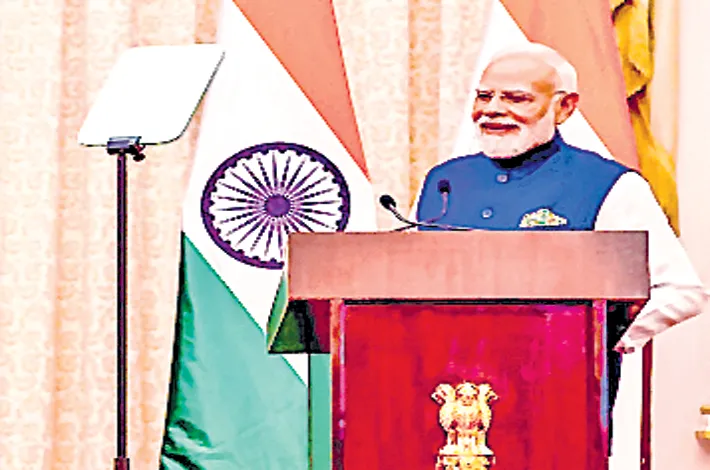Whispers in Rakesh Thakur’s Haveli
02-10-2025 12:00:00 AM

The missing Roman coins in the haveli shook the town and its residents
Sprawled over three acres of mist-kissed hill land, the estate boasted arched gateways, Mughal-styled gardens with fountains that sang to the wind, and several bungalows—each built in stone and teak, echoing the old-world charm of forgotten royalty. The rose maze near the eastern boundary, the marble gazebo overlooking the valley, and the peacocks that roamed freely added to its mystique.
Forty servants maintained this grandeur. From gardeners and cooks to caretakers of the antique collections, each had a role, and each answered only to Rakesh Thakurthe aging but sharp-eyed patriarch of the Thakur family.
Among the many priceless artefacts in the haveli, there was one set he prized above all: 48 Roman coins, each over 1,800 years old, passed down from his grandfather, who acquired them in Europe during the war. Kept in a velvet-lined rosewood box inside the library’s locked display cabinet, these coins were insured, catalogued, and rarely touched.
Until they vanished.
It began on a cold November morning. Thakur had invited a few guests—historians from Shimla University—to view the collection. But when the cabinet was unlocked, the coins were gone.
The room fell silent.
There was no sign of forced entry. No broken locks. No shattered glass. Just an empty velvet box and a weight in everyone's chest.
Thakur's face was unreadable, but his silence was louder than a storm.
“I want no police,” he said coldly to his steward, Basant Lal. “Not yet. Begin within. Someone in this haveli is playing a dangerous game.”
And so began the quietest investigation the hills had ever known.
Basant Lal, a short, stooped man with silver in his hair and loyalty etched into every wrinkle, was considered Thakur’s shadow. He had served the family for 38 years—longer than some of the younger servants had been alive. It was he who led the internal probe, aided by Dev, the head groundskeeper, and Tara, the sharp-eyed housekeeper.
Every servant’s quarters were searched. Trunks, wardrobes, even the kitchens were turned upside down. But there was no trace of the coins.
Weeks passed. Whispers floated through the estate like cold wind through cracks in a wall. The servants were uneasy. Friendships frayed. Suspicion hung heavy in the air.
Some said it had to be an outsider. Others hinted at the younger staff—perhaps Hari, the errand boy who’d joined only last month, or Meena, the maid who often lingered near the library.
But Thakur said nothing. He watched.
On the 31st day, Dev found something unusual.
While inspecting the old storage bungalow near the western boundary—a place unused for years—he noticed a section of the floorboards was slightly loose. Beneath it, wrapped in muslin and tucked into a rusted tin box, were the 48 Roman coins.
All intact. All accounted for.
When the coins were returned to Thakur’s study, he ran his fingers over them slowly. For a moment, a rare softness crossed his face.
“Now,” he said finally, “let's find the hand that moved them.”
The discovery only deepened the mystery. Why hide the coins within the estate itself? Why not sell them or flee with them?
Tara voiced what everyone was thinking: “It was someone close, someone who knew they couldn’t take them far.”
That evening, Thakur summoned all forty servants to the central courtyard. Flames from the stone torches cast long shadows on the lawn as he stood on the steps, tall despite his age, his eyes sharp under the fading sky.
“I trusted all of you,” he began. “Some of you were born here. Raised here. But one of you...” He paused, letting the silence sink in. “...has betrayed this house.”
No one moved.
He raised a hand. “Come forward, Basant Lal.”
A collective gasp rose. Basant, confused, stepped forward with folded hands.
“My lord?”
“You’ve been here almost four decades. You knew the library, the locks, the hiding places. You led the search. But you never searched the storage bungalow. Why?”
Basant’s face paled. “It was empty, sir. We never used it.”
“Exactly. Which made it the perfect hiding spot.”
There was murmuring among the servants now. Dev stepped forward with something in his hand—an old key.
“Found this in Basant ji’s desk drawer yesterday. It’s to the bungalow.”
Basant looked from Thakur to Dev, then down at the earth beneath his feet.
“I didn’t mean to steal them,” he said at last, voice cracking. “I only wanted to protect them.”
“Protect them?” Thakur’s voice was calm, but cold as snow.
“There were rumours,” Basant continued, “about outsiders wanting to buy the estate…the younger heirs talking about selling the coins. I couldn’t bear it. They belong here. To you. To the haveli. So I hid them, to delay the appraisal. I thought… I thought if they disappeared, the matter would drop.”
Tears rimmed his eyes. “I served you my whole life, Thakur saab. I never wanted to betray you.”
But betrayal it was.
Thakur closed his eyes. A long silence followed.
“Loyalty is not obedience,” he said slowly. “It is honesty. And trust. You broke both.”
The next morning, Basant Lal left the haveli quietly, with nothing but a shawl and a small satchel. No police were called. Thakur would not have the name of the house dragged through courts or papers.
In the weeks that followed, life returned to normal. The coins were placed back in the cabinet, though now under tighter surveillance. A new steward was appointed. The whispers faded, but a kind of mourning lingered—not just for the theft, but for the man who had fallen from grace.
And Rakesh Thakur?
He stood often in the rose maze now, hands behind his back, gazing out over the hills.
He had recovered his treasure, yes.
But at a cost far dearer than gold.








